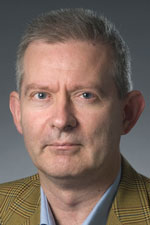Johnny Laursen’s comment on the need to scale back admissions
The Ministry of Higher Education and Science’s plan to reduce the number of admissions to university degree programmes is a serious challenge to the Faculty of Arts.

Dear staff and students
On Tuesday the Ministry of Higher Education and Science announced its plan for what it calls the “dimensioning” of admissions to university degree programmes and other courses of education. This plan means that from 2015 to 2017 AU will have to gradually scale back the number of Master’s admissions by 525 study places, with the Faculty of Arts accounting for 390 of these. From 2015 onwards it will also be necessary to scale back the number of Bachelor’s admissions to ensure that they match the number of Master’s admissions in 2017. These reductions must be made within what are referred to as “groups of degree programmes” (see table below).
There is no doubt that this task constitutes a serious academic and financial challenge. For a number of years we have adopted a conservative approach in terms of increasing the number of Bachelor’s admissions, while the number of Master’s admissions has grown – for instance on our education degree programmes (related to the Danish Folkeskole, for instance) and on our international Master’s degree programmes. One of the main reasons for this approach is the need to comply with our national commitments in relation to supplementary degree programmes for people who are already in employment, and the need to internationalise our Master’s degree programmes.
So it is a serious problem that the focus has been placed on Master’s degree programmes, which are the key to mobility and cohesion in the post-secondary education system. The move seems to be based on the idea that universities only offer Master’s degree programmes to their own Bachelor’s graduates. The fact is that the new plan will be a major setback following years of hard work to ensure flexibility and the international dimension of our degree programmes.
The fact that the plan is based on retrospective employment figures is also a major cause of concern. Denmark has one of the world’s most thorough and robust processes for approving new university degree programmes – for instance, proof is required that new programmes will meet expectations regarding the future needs of the labour market. So it is surprising that the plan fails to consider the future expectations of employers and the steps taken by the universities to equip their Master’s graduates for a career, instead of relying on retrospective employment figures.
The university now has until 20 November to announce its plans regarding admissions to Master’s degree programmes within the groups of degree programmes affected. At the moment we are working hard to establish the information base we need. This is not easy – for instance, there is still a good deal of uncertainty about how (and indeed whether) the new model takes account of Bachelor’s graduates with a legal right of admission to Master’s degree programmes.
The faculty now needs to carefully consider the consequences that the plan will have for the faculty and the individual departments. Finally, we will of course be keeping in touch with our colleagues at the other Danish universities. The faculty’s decision about the reductions will be based on local discussions at our departments and centres.
This is a major challenge for the faculty and for the university as a whole. Even though we acknowledge the necessity of adapting our degree programmes to meet the needs of the labour market, it is highly regrettable that this has resulted in a plan which reflects such a high level of detailed control. In particular, it is regrettable that the plan was not developed in collaboration with the Danish universities and future employers.
The plan will damage our previous efforts to ensure flexibility, mobility and internationalisation in the Danish education system. So I hope that the minister will now listen to the criticism of the universities, enabling us to achieve the reductions based on dialogue with panels of employers and boards of studies, and with due regard for relevant unemployment figures and the coordinated efforts of the universities involved.
Best wishes
Johnny Laursen
Acting Dean
AU: Maximum admissions (groups of degree programmes and individual degree programmes)
Group of programmes | Individual programme | Adm. 2013 | Max. adm. 2015* | Max. adm. 2016* | Max. adm. 2017* |
Bio (Science), Master |
| 153 | 138 | 122 | 107 |
Business communication (Arts), Master |
| 235 | 219 | 203 | 187 |
Ethno-/anthropology (Social Sciences), Master |
| 64 | 57 | 50 | 44 |
Foreign languages (Arts), Master |
| 161 | 145 | 128 | 112 |
Classical humanities, Master |
| 425 | 377 | 329 | 282 |
Media and communication (Arts), Master |
| 237 | 220 | 203 | 185 |
Aesthetic subjects (Arts), Master |
| 170 | 159 | 148 | 137 |
Others (Science), Master |
| 91 | 79 | 66 | 54 |
Commerce (Social Sciences), Master | Experience economy, Master, 2 years | 45 | 41 | 36 | 32 |
Education (Arts), Master | Educational philosophy, Master, 2 years | 113 | 102 | 90 | 79 |
Education (Arts), Master | Educational anthropology, Master, 2 years | 150 | 135 | 120 | 105 |
Others (Health), Master | Biomedical technology, Master, 2 years | 22 | 20 | 19 | 17 |
NB: *The admission figures show the ceiling, if there is no agreement about redistribution between two or more institutions.
Admissions 2013 are calculated based on figures reported by Statistics Denmark.